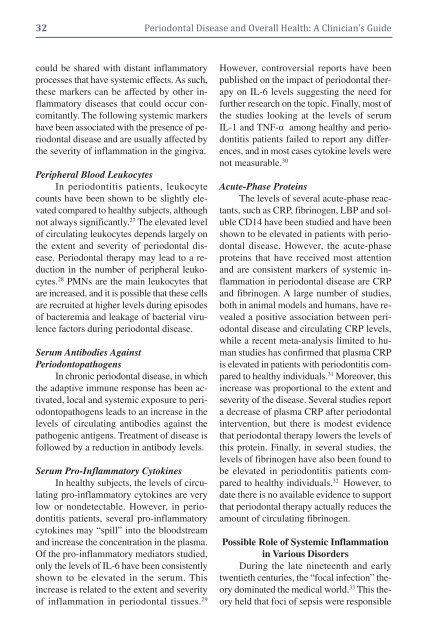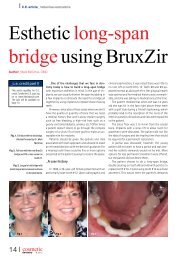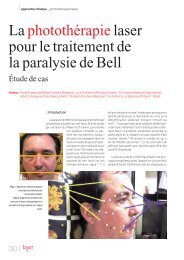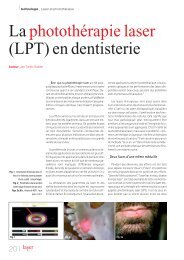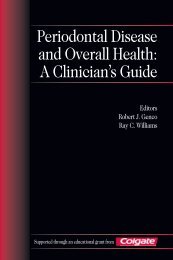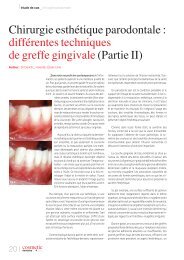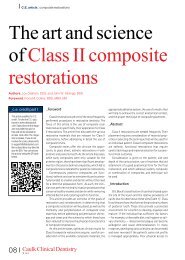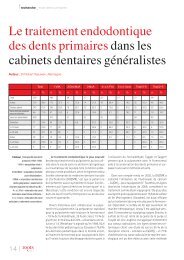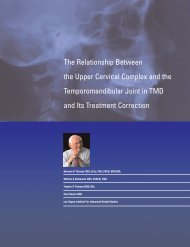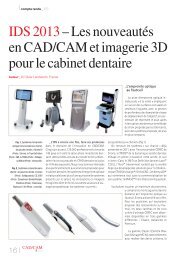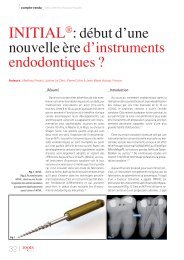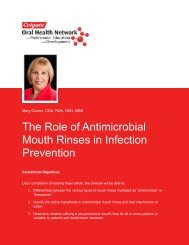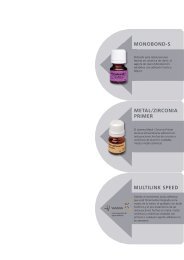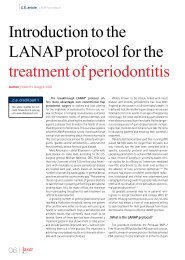Periodontal Disease and Overall Health: A Clinician's Guide
Periodontal Disease and Overall Health: A Clinician's Guide
Periodontal Disease and Overall Health: A Clinician's Guide
Create successful ePaper yourself
Turn your PDF publications into a flip-book with our unique Google optimized e-Paper software.
32 <strong>Periodontal</strong> <strong>Disease</strong> <strong>and</strong> <strong>Overall</strong> <strong>Health</strong>: A <strong>Clinician's</strong> <strong>Guide</strong>could be shared with distant inflammatoryprocesses that have systemic effects. As such,these markers can be affected by other inflammatorydiseases that could occur concomitantly.The following systemic markershave been associated with the presence of periodontal disease <strong>and</strong> are usually affected bythe severity of inflammation in the gingiva.Peripheral Blood LeukocytesIn periodontitis patients, leukocytecounts have been shown to be slightly elevatedcompared to healthy subjects, althoughnot always significantly. 27 The elevated levelof circulating leukocytes depends largely onthe extent <strong>and</strong> severity of periodontal disease.<strong>Periodontal</strong> therapy may lead to a reductionin the number of peripheral leukocytes.28 PMNs are the main leukocytes thatare increased, <strong>and</strong> it is possible that these cellsare recruited at higher levels during episodesof bacteremia <strong>and</strong> leakage of bacterial virulencefactors during periodontal disease.Serum Antibodies AgainstPeriodontopathogensIn chronic periodontal disease, in whichthe adaptive immune response has been activated,local <strong>and</strong> systemic exposure to periodontopathogensleads to an increase in thelevels of circulating antibodies against thepathogenic antigens. Treatment of disease isfollowed by a reduction in antibody levels.Serum Pro-Inflammatory CytokinesIn healthy subjects, the levels of circulatingpro-inflammatory cytokines are verylow or nondetectable. However, in perio -dontitis patients, several pro-inflammatorycytokines may “spill” into the bloodstream<strong>and</strong> increase the concentration in the plasma.Of the pro-inflammatory mediators studied,only the levels of IL-6 have been consistentlyshown to be elevated in the serum. Thisincrease is related to the extent <strong>and</strong> severityof inflammation in periodontal tissues. 29However, controversial reports have beenpublished on the impact of periodontal therapyon IL-6 levels suggesting the need forfurther research on the topic. Finally, most ofthe studies looking at the levels of serumIL-1 <strong>and</strong> TNF-α among healthy <strong>and</strong> perio -dontitis patients failed to report any differences,<strong>and</strong> in most cases cytokine levels werenot measurable. 30Acute-Phase ProteinsThe levels of several acute-phase reactants,such as CRP, fibrinogen, LBP <strong>and</strong> solubleCD14 have been studied <strong>and</strong> have beenshown to be elevated in patients with perio -dontal disease. However, the acute-phaseproteins that have received most attention<strong>and</strong> are consistent markers of systemic inflammationin periodontal disease are CRP<strong>and</strong> fibrinogen. A large number of studies,both in animal models <strong>and</strong> humans, have revealeda positive association between periodontaldisease <strong>and</strong> circulating CRP levels,while a recent meta-analysis limited to humanstudies has confirmed that plasma CRPis elevated in patients with periodontitis comparedto healthy individuals. 31 Moreover, thisincrease was proportional to the extent <strong>and</strong>severity of the disease. Several studies reporta decrease of plasma CRP after periodontalintervention, but there is modest evidencethat periodontal therapy lowers the levels ofthis protein. Finally, in several studies, thelevels of fibrinogen have also been found tobe elevated in periodontitis patients comparedto healthy individuals. 32 However, todate there is no available evidence to supportthat periodontal therapy actually reduces theamount of circulating fibrinogen.Possible Role of Systemic Inflammationin Various DisordersDuring the late nineteenth <strong>and</strong> earlytwentieth centuries, the “focal infection” theorydominated the medical world. 33 This theoryheld that foci of sepsis were responsible


